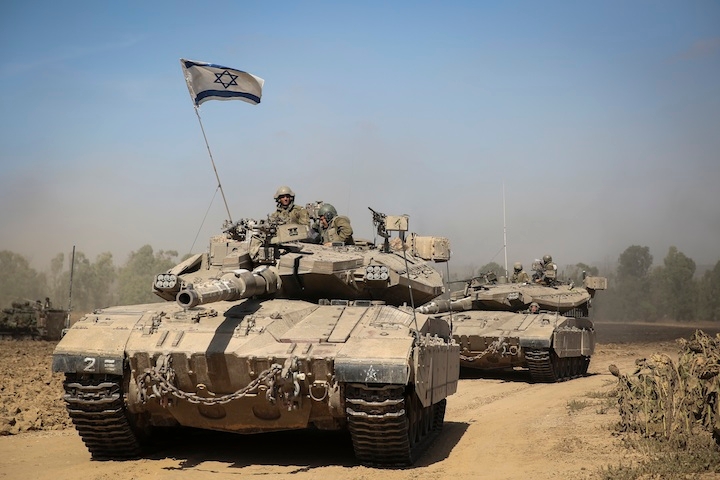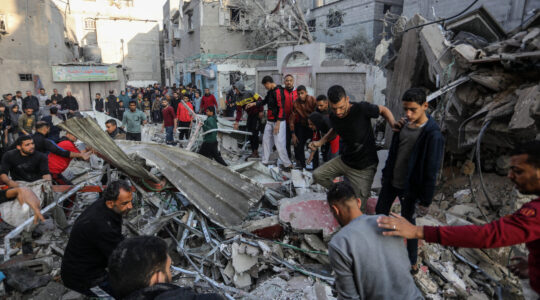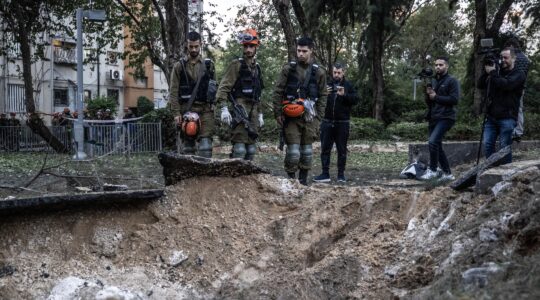TEL AVIV (JTA) — For the first time in years, Israeli ground troops crossed into Gaza.
Rather than just return to the status quo before the conflict of “quiet for quiet” — no Hamas missiles and no Israeli airstrikes — Israel’s stated objectives are to bring a sustained cessation to missile fire from Gaza and to root out the infrastructure that Hamas has used to build up its weapons cache.
“Operation Protective Edge will continue until it reaches its goal,” read a statement from Israeli Prime Minister Benjamin Netanyahu Thursday announcing the invasion. “Restoring quiet to Israel’s citizens for a prolonged period, while inflicting a significant blow to the infrastructures of Hamas and the other terrorist organizations.”
The Israeli ground invasion of Gaza – its first since 2009 — aims to destroy Hamas’ underground weapons stores and its network of tunnels in Gaza, which it uses to transport arms and personnel. In the first stages of the invasion Friday, Israeli troops identified several tunnels and entered Gaza City and other urban centers. Israel also lost its first soldier in the operation Friday, Sgt. Eitan Barak, 20.
Netanyahu said Friday that the Israel Defense Forces should prepare for a “significant expansion” of the invasion.
“Even here there is no guarantee of 100 percent success, but we are doing our utmost in order to achieve the maximum,” Netanyahu said. “We chose to commence this operation after we had exhausted the other possibilities, and with the understanding that without action, the price that we would pay would be much greater.”
The invasion comes after a week and a half of Hamas missiles and Israeli airstrikes, along with failed efforts to reach a cease-fire. Hamas has so far launched more than 1,500 rockets at cities across Israel, and Israel has conducted more than 2,000 airstrikes in Gaza. Two Israelis and 265 Palestinians have now died in the conflict.
Before Israel’s ground invasion, Hamas had tried and failed to attack Israel by sea and land. On Thursday morning, the Israeli army spotted 13 Hamas militants entering Israel via a tunnel near a kibbutz. Once the militants saw they had been noticed, they escaped back into Gaza. The army said the group planned to kidnap Israelis.
“IDF forces thwarted an impending terror attack, preventing the terrorists from attacking an Israeli kibbutz,” the army said in a statement. “The foiled attack could have had deadly and devastating consequences if carried out.”
The attack came after Israel had accepted an Egyptian cease-fire deal Tuesday, which proposed an end to attacks, and had ceased airstrikes for six hours. But Hamas rejected the proposal, demanding that Israel end its blockade of Gaza and release dozens of Hamas prisoners.
Had that cease-fire deal worked, the conflict would have ended much like the last Israel-Gaza clash in 2012, which saw only Israeli airstrikes. But ongoing negotiation attempts in Cairo failed Thursday, hampered by mistrust between Israel and Hamas, as well as between Hamas and the current Egyptian government led by President Abdel Fattah al-Sisi, a former army chief.
In 2012, the Muslim Brotherhood-led Egyptian government was friendly to Hamas and increased trade with Gaza. But the new government, which opposes the Brotherhood, has been hostile to Hamas, closing the border crossing between Gaza and Egypt.
“Recently inaugurated president Abdul Fattah al-Sisi shares Washington and Israel’s view of Hamas as both a terrorist organization and a strategic threat,” wrote Eric Trager, a fellow at the Washington Institute for Near East Policy, in a policy paper. “He is consequently both less able and less willing to fulfill Egypt’s traditional role of mediating between Hamas and Israel.”
Israel’s offensive in 2009 ended after three weeks, but some members of Netanyahu’s coalition want to go much further this time. Before the invasion, several Cabinet ministers and members of Netanyahu’s right-wing Likud party said that Israel can ensure an end to rocket fire only by recapturing Gaza, which Israel withdrew from in 2005.
Israel’s foreign minister, Avigdor Liberman, had strongly criticized Netanyahu for not responding more aggressively to Hamas.
“Israel must go all the way,” Liberman said at a press conference Tuesday. “We must finish the operation with the IDF controlling all of the Gaza Strip.”
JTA has documented Jewish history in real-time for over a century. Keep our journalism strong by joining us in supporting independent, award-winning reporting.






